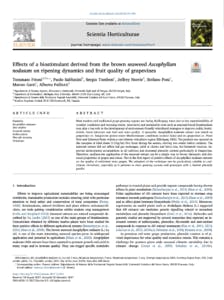Most modern and traditional grape-growing regions are facing challenging times due to the unpredictability of weather conditions and warming trends. Innovative and sustainable tools such as seaweed-based biostimulants may play a key-role in the development of environment-friendly viticultural strategies to improve yields, biotic/abiotic stress tolerance and fruit and wine quality. A sprayable Ascophyllum nodosum extract was tested on grapevines cv. Sangiovese grown under Mediterranean conditions (central Italy) and on grapevines cv. Pinot Noir and Cabernet Franc within a cool-climate viticulture region (Michigan, USA). The product was sprayed on the canopies at label doses (1.5 kg/ha) five times during the season, starting two weeks before veraison. The seaweed extract did not affect leaf gas exchanges, yield or cluster and berry size, but hastened veraison, im-proved anthocyanins accumulation in all cultivars and increased phenolic content particularly in Sangiovese. Therefore, medium-late application of the seaweed extract can be a simple way to favour chromatic and che-mical proprieties of grapes and wines. This is the first report of positive effects of Ascophyllum nodosum extracts on the quality of cultivated wine grapes. The adoption of the technique can be particularly suitable to cool-climate viticulture, especially as it pertains to short growing seasons and genotypes with a limited phenolic profile.

December 21, 2017 / Article